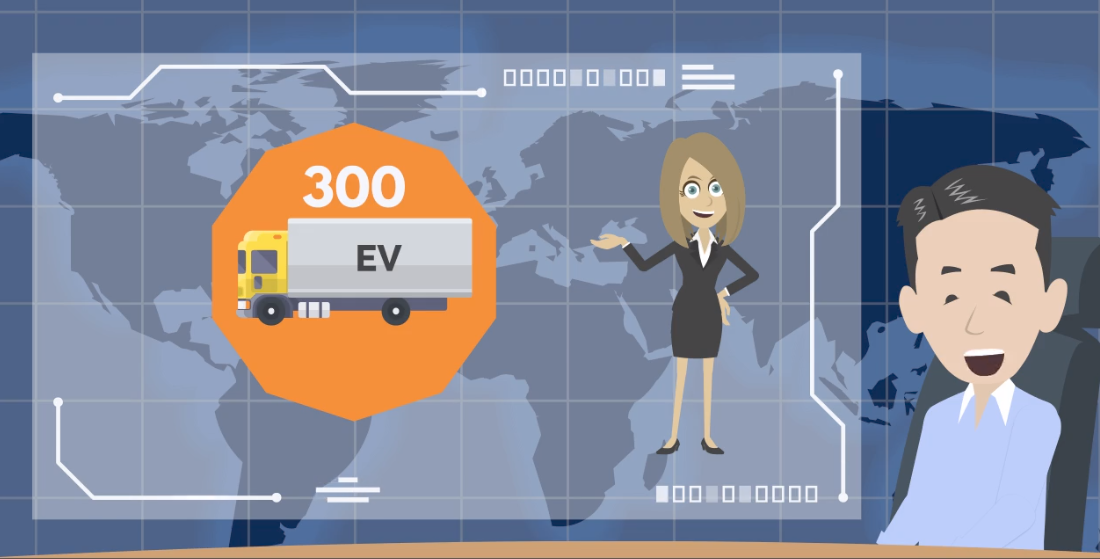
 Neko Senpai
Neko Senpai Logistics News in March 2022!
- Video of This Article
- Russia and Ukraine Situation Shifts Cargo Shipment from Land to Sea and Air
- Fuel Costs Soared due to Situation in Russia and Ukraine. Shippers Face Higher Fuel Surcharges in addition to Higher Freight Rates
- Fuel Costs for Ships and Trucks Soared due to High Oil Prices. Shippers Prepare to Raise
- North American Importers Restructure Supply Chain. Prepare for North American Collective Bargaining Agreement in July
- Maersk Introduces 300 EV Trucks in North America from 2023 to 2025. Automated Driving is Underway
- Shanghai City Lockdown. Port of Shanghai Normal, No Disruptions in Marine Transportation. Air Cargo Flights are Cancelled
- Commentary Section
- Contact to IINO san
Video of This Article
 Kamome Senpai
Kamome Senpai This is 10:42 video!!

Hello, it’s IINO.
In this video, I bring you the logistics news for March 2022.
The main topics will be the situation in Russia and Ukraine, rising fuel costs, negotiations on North American West Coast ports and decarbonization.
Russia and Ukraine Situation Shifts Cargo Shipment from Land to Sea and Air

This is news when no specific economic sanctions have yet been imposed on Russia.
Forwarders are suspending some services and shifting their services from land to sea or air to avoid regulation and disruption.

FourKites Inc., a Chicago-based company says the dispute will cause shipping rates to skyrocket, especially between Asia and Europe.
The company states that if the Trans-Siberian Railway connection is disrupted, cargo volumes from China to the European Union could shift to sea or air.
Fuel Costs Soared due to Situation in Russia and Ukraine. Shippers Face Higher Fuel Surcharges in addition to Higher Freight Rates

This is followed by another news item on the Russia and Ukraine situation. After Russia’s invasion of Ukraine, the oil market is soaring.
A large increase in bunker surcharges has raised the possibility of a large increase in fuel costs on top of the already high ocean freight rates.

There is a fuel surcharge called BAF, Banker Adjustment Factor, which is a cost that is adjusted, when there is a change in fuel costs in marine transportation.
Also used under the names FAF and EBS.
Fuel Costs for Ships and Trucks Soared due to High Oil Prices. Shippers Prepare to Raise

Shippers are concerned about new fuel costs and the impact on transportation as the Russia-Ukraine war continues.

The rising fuel surcharges could shift the emphasis in the U.S. supply chain from “speed of delivery” to “cost” according to the report.
Shippers may become more inclined to use intermodal rail, especially for long-distance shipments.

According to analyst of North America, the trade-off between “expedited delivery” and “soaring fuel costs” will be at the forefront of shipper negotiations with customers.
In addition, if shippers who choose to use rail are discouraged from using trucks, the port may become congested.
North American Importers Restructure Supply Chain. Prepare for North American Collective Bargaining Agreement in July

This July, the North American West Coast collective bargaining agreement will expire and renegotiations will begin.
In the meantime, there will be strikes at West Coast ports.

In preparation for the strike, some shippers are moving up their orders for holiday season and diverting cargo from the West Coast to the East Coast and Gulf Coast.
However, some are finding it difficult to handle cargo from the ports of LA and LB which handle nearly 40% of the U.S. container imports at other ports.

This year’s negotiations are likely to be favorable to the dockworkers’ union, as the market is disrupted by congestion in the supply chain with dozens of vessels waiting offshore.
Maersk Introduces 300 EV Trucks in North America from 2023 to 2025. Automated Driving is Underway

Major shipping company Maersk has announced that it will introduce 300 EV trucks in North America between 2023 and 2025.
In partnership with Swedish company Einride, Maersk will use its platform for the vehicles it introduces.

The head of the department in charge of Maersk said, “With the introduction of these EV trucks, we have demonstrated our commitment to decarbonization in all sectors regardless of the mode of transport.”

In North America, the goal is to transition to fully electric trucking. Therefore firstly, the plan is to move toward automated driving on highways where driving is less complex.
If automated trucks can be used on highways, there will be no need to rely on manpower for long distances across state lines.
Since it can avoid supply chain disruptions due to manpower shortages, it is expected to be a future mode of operation.
Shanghai City Lockdown. Port of Shanghai Normal, No Disruptions in Marine Transportation. Air Cargo Flights are Cancelled

The city of Shanghai, China, has been on lockdown since March 28. However, there is not the major disruption to international shipping that was feared.
The lockdown takes effect from March 28 to April 1 in the eastern part of Shanghai, and from April 1 to April 5 in the western part.

The Port of Shanghai is operational, but logistics on the land side are stagnant.
Trucks including drayage vehicles can pass through if they meet conditions such as negative driver certification.

However, there is concern that traffic restrictions within the city and travel restrictions to and from outside the city will exacerbate delays in land transportation.
It is also expected that demand for cargo transported by truck to the Port of Shanghai will flow into barges and railroads.

On the other hand, Air has experienced a string of cancellations.
According to the officials, while airline flights can land at Shanghai Pudong Airport, ground handling operations cannot be staffed resulting in the cancellation of flights.
Commentary Section

Let’s turn now to commentary section.
First up is news on the Russia and Ukraine situation.
Forwarders had been shifting their services from land to sea or air considering the risk of disruption of the Trans-Siberian Railway.
However, due to economic sanctions from various countries in the protracted war, transportation services to and from Russia with the exception of humanitarian aid materials have effectively been suspended.
At this time, the Trans-Siberian Railway is still in operation but forwarders from various countries have stopped booking shipments by rail to avoid the risk of cargo loss in Russia.
Soaring Oil Market

In addition, the oil market has soared, since Russia’s invasion of Ukraine.
According to the Oil Price Reporting Organization, the price of low-sulfur fuel oil, VLSFO, as of March 14, averaged $986/ton at major hub ports, up about $230, 26% from $752 on February 24 before Russia invaded Ukraine.
The focus will be on whether the shipping companies will absorb this cost, charge shippers for the delay or pass it on to the shippers immediately.

Low-sulfur heavy oil runs 70% of the world’s vessels that are not equipped with an exhaust gas cleaning device called a scrubber.
There are regulations that require the use of higher quality low-sulfur fuel rather than C fuel oil which produces PM2.5. Ships can use cheaper C fuel oil if they are equipped with scrubbers.
The rising price of low-sulfur fuel oil may cause some shipping companies to invest in scrubbers.
Shippers, Shifting Their Focus to Cost

With rising fuel prices, shippers are shifting their focus to cost rather than speed.
There is also a trend toward inexpensive intermodal, but the switch is not an easy one due in part to a lack of intermodal rail and yard capacity as well as chassis shortages.
Shippers’ average truckloads have decreased by 10-20% over the past year due to disruptions in the logistics network. However, in the future, truckloads will need to be maxed out for transportation.
Labor Negotiation on the West Coast of North America in July

There is also movement toward labor negotiations on the West Coast of North America in July.
In February, the National Retail Federation urged the Longshoremen’s Union, ILWU, and the Pacific Maritime Association, PMA, the employers’ organization to begin talks as soon as possible.
PMA said it was ready to begin negotiations immediately, but ILWU said it would not be ready until May.
For ILWU, there is no reason to start immediately as the more disorganized the market is the more advantageous the negotiations will be. It is likely to take much longer for this negotiation, which has port automation as its theme.
Strategy of Maersk

Next, shipping company Maersk announced the introduction of 300 EV trucks.
Maersk is currently the world’s second largest container shipping company and in recent years it has been acquiring various companies and shifting its strategy toward total logistics not just shipping.

There is currently a serious shortage of truck drivers in North America with an estimated shortage of about 80,000.
In order to solve the manpower shortage problem, they are aiming to automate highway driving but it will be difficult to achieve this soon due to different regulations in different states and safety issues.
Impact of Shanghai Lockdown
Finally, we have news of Shanghai lockdown.
The port is not in trouble but trucking is experiencing problems and cargo is likely to be difficult to pick up.
Since the Port of Shanghai is the largest port in the world, the impact will be significant and it will be interesting to see how this will affect shipments to North America and Europe.

How was this news?
If you found it useful and easy to understand, please subscribe to the channel, follow us and share on social networking sites.
That’s all for this time. Thank you!
Contact to IINO san

★Contact to IINO san★
—————————————–
FaceBook Page
https://www.facebook.com/iinosaan
Linked In Message
https://www.linkedin.com/in/shinya-iino/
Twitter DM
https://twitter.com/iino_saan
—————————————–
 IINO
IINO I’m waiting for your contact!









